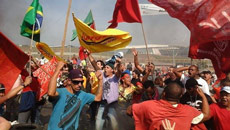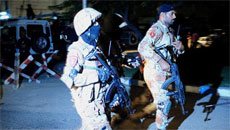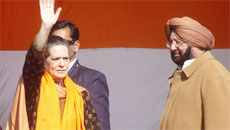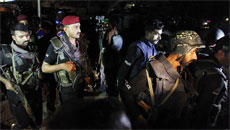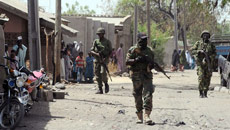Things are very strange in Britain nowadays. People are talking politics. Pubs, supermarkets, hospitals, offices, everywhere people are more engaged in political debate than gossiping, thanks to the Scottish referendum. A record 85 percent of the electorate participated in the referendum to determine Scotland's independence.
North, South, East Anglia, Midlands, Wales, other parts of the country are now flooded with the spillover from the highlands.
The whole country is politically charged as general elections are due within eight months. Just 17 percent of the electorate participated in the last national election for the police commissioners. The present trend shows over 70 percent will cast their votes in the May 2015 elections. Political parties and the politicians were not expecting the new turn of events.
England, which granted home rule for many provinces during the empire era, is now seeking the same privileges as a nation on tax and welfare legislation. The Scottish referendum has triggered fresh debates of English Home Rule; a federal system like the United States; a Constitutional Convention to bring ground-breaking reforms; equality and social justice like proportional budget allocation for Wales and Northern Ireland, besides devolution of power to more city regions.
Labour leader Ed Miliband is in a fix as Prime Minister David Cameron begins consultation on English Home Rule. He hosted a meeting of senior Conservative MPs at Chequers to discuss plans to limit the Commons voting rights of Scottish MPs, the majority from the opposition Labour party.
The Chequers' summit comes amid disquiet on the Tory backbenches about the promises made to Scotland during the referendum campaign. Among those who attended the meeting were John Redwood, who wants to see an English Parliament, and Bernard Jenkin who has called for the UK to move to a federal system.
The prime minister has said a pledge to give Scotland more powers should go hand-in-hand with changing the role of Scottish politicians at Westminster. In the last election, Scotland sent 40 Labour MPs, Liberal Democrats won 11 and Cameron's Conservatives bagged just one.
The prime minister's move will limit Labour's say on many of the Westminster debates. The prime minister has asked Commons leader William Hague to draw up plans to restrict votes on English matters to English MPs - and promised a more wide-ranging shake-up of the constitution.

Cameron said: "Just as Scotland will vote separately in the Scottish Parliament on their issues, of tax, spending and welfare, so too England, as well as Wales and Northern Ireland should be able to vote on these issues and all this must take place in tandem with, and at the same pace as, the settlement for Scotland."
Labour has accused Cameron of "playing the English nationalist card".
Miliband said he remained committed to the timetable for new powers for Scotland - but he would not be signing up to Cameron's plan for English MP votes. Instead, the Labour leader announced plans for a national debate on all aspects of Britain's constitution. If Labour wins the general election, this would be followed by a Constitutional Convention, in the autumn of 2015, and then by legislation.
Miliband faces the prospect of his party's Scottish MPs being stripped of the power to vote on crucial issues such as health, education and finance under Cameron's proposals, potentially undermining a future Labour government.
Liberal Democrat Cabinet Minister Danny Alexander, who is among the party's 11 Scottish MPs, said Conservative "briefings" were "deeply frustrating" and had distracted from the cross-party commitment on devolution.
"It has always been the case that the Scottish process must be independent of any other political discussions and must be dealt with according to the timetable we set out," he was quoted as saying. "For wider constitutional changes, it would be preferable to have all-party consensus."
The three main parties pledged more devolution during the campaign to encourage Scots to reject independence.
Cameron, Miliband and Deputy Prime Minister Nick Clegg have pledged "extensive" new powers over tax, welfare and spending to the Scottish Parliament although their three parties differ over how much control Holyrood would have over income tax rates and other economic levers.
The leaders have agreed to abide by the principle that the UK exists to "ensure opportunity and security for all by sharing our resources equitably".
They have also insisted that the Barnett formula, the method used to determine the distribution of public spending around the UK per head of the population, would stay in place and that the final say on funding for the National Health Service (NHS) would lie with the Scottish government.
Clegg, who backs Cameron's timetable for further Scottish devolution and plans for England-only votes at Westminster, has backed calls for decentralisation of tax and spending powers to beefed-up "city regions".

City regions will be a nightmare for the Conservatives. Devolution to England would probably mean Conservative majority rule in England but devolution to regions or city-regions would mean more Labour enclaves. For example, in Manchester, all the city councillors -- 101 -- are from the Labour Party and the Conservatives failed to win a single seat. The situation is almost similar in Liverpool, Sheffield and other northern cities.
The referendum is over. But the debates it sparked still lingers on. Britain won't be the same as more and more join the debate adding new angles to the complex issue.
